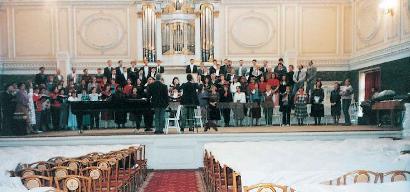Sergei Rachmaninov – The Vespers (All Night Vigil) [1992]
Sergei Rachmaninov – The Vespers (All Night Vigil) [1992]

01. O come and Worship
02. Praise the Lord
03. Blessed in the Man
04. O Joyful Ligot
05. Now Lettest Thou Depart
06. Hail Mary
07. Glory be to God
08. O Praise Our God
09. O Lord, show me Truth
10. Christ’s Resurrection
11. My Soul Doth Magnify
12. Glory be to God
13. This Day of Salvation
14. You Rose from the Dead
15. O Holy Mother
St.Petersburg Academic Glinka Cappella
Vladislav Chernushenko – director
Vespers (All-Night Vigil), for alto, tenor & chorus, Op. 37.
Sergey Rachmaninov famously recalled the night when he first played the score of his All-Night Vigil for a pair of the most prominent Russian musicians. Nikolai Danilin, who had agreed to conduct the work's premiere, lamented that the basses able to sing his impossibly profundo pitches were "as rare as asparagus at Christmas." Yet the composer replied, "I know the voices of my countrymen!" And he did know both the voices of his countrymen and their deep religious spirit (which not even the Revolution could eradicate). Rachmaninov premiered the Vsenoshchnoye bdeniye (All-Night Vigil, or Vespers Mass) in 1915, amid the privations of World War I. Russian basses were found to sing the parts, and Russians were hailing the Vespers as a masterpiece even before the performance began.
Though not personally close to the Russian Orthodox Church, Rachmaninov had been throughout his life deeply moved by its music. He evoked Russian church bells frequently in his music, had quoted Orthodox chants in his Symphony No. 1, and achieved large-scale success in an earlier setting of the Liturgy of St. John Chrysostom. His Vespers resembles the earlier work in flavor, but greatly expands its harmonic pallette. The 15 movements of the Vespers together form the core of a well-known Russian Orthodox monastic service; larger churches would also celebrate the Vigil on the night before greater feasts. Its series of texts (in traditional Church Slavonic) include several psalms and the Orthodox versions of the Magnificat, Nunc dimittis, and Greater and Lesser Doxologies. In fully nine of the movements, the composer adapts a rich variety of plainchant melodies: the most ancient "Znamenny" chants, simpler Russian "Greek" chants, and folk-like Kiev chants.
On the scaffold of these chants the composer hangs a musical tapestry of Byzantine texture, sobriety, and power. Many of his eight-voiced choral textures remain in a flowing and chant-like homophony. His harmonic language is tonally grounded with frequent pedal points, but also rich modal and chromatic inflections. Antiphonal textures (Nos. 2, 8, 10) and liturgical refrains (Nos. 3, 9, 11, 12) evoke the incense-choked atmosperes of the church. At the same time, local text details can inspire him to exsquisite passages, such as the radiant harmonic shift before the first tenor solo (No. 4) and the clusters of angelic melismas at the climax of No. 7. The Orthodox Nunc dimittis (No. 5) closes with a slow bass descent to low B flat; it was Rachmaninov's favorite movement and the music he intended for his own funeral. ---Timothy Dickey, Rovi
download: uploaded yandex 4shared mediafire solidfiles mega filecloudio nornar ziddu
Last Updated (Saturday, 29 March 2014 13:52)








